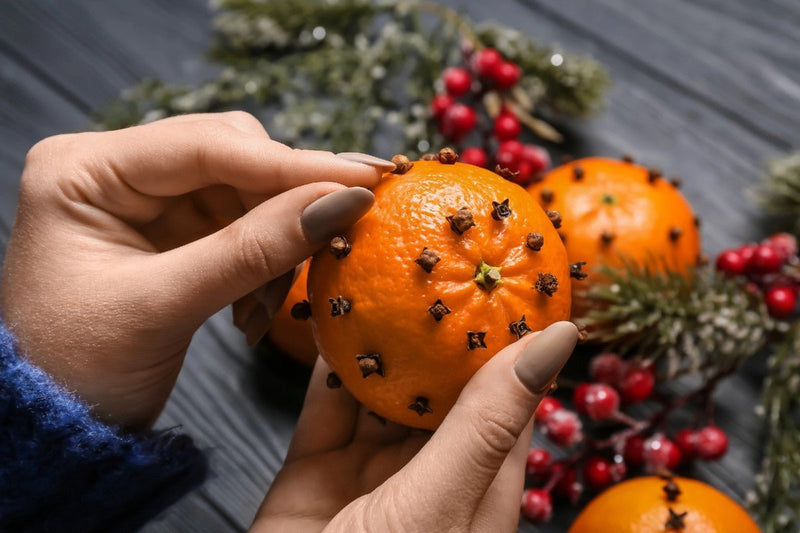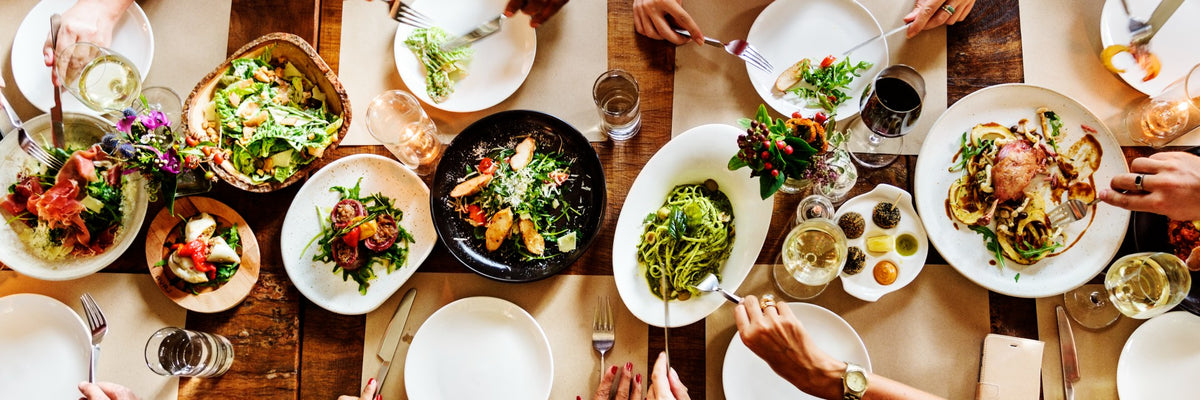
These fragrant decorations have been a part of holiday celebrations for centuries, symbolizing prosperity, health, and good fortune and are more than just decorations; they embody the joy and creativity of the season.
The holiday season brings opportunities to embrace timeless traditions that fill our homes with warmth and nostalgia. Among these cherished customs, making orange and clove pomanders stands out for its simplicity, beauty, and aromatic appeal. Crafting them is a relaxing activity that can be done solo or with family and friends.
Children, in particular, enjoy creating their own designs and patterns, making pomanders a wonderful holiday craft for all ages and is an excellent craft activity to keep young and old entertained at Thanksgiving get-togethers. Additionally, the natural fragrance of oranges and cloves provides an eco-friendly alternative to artificial sprays or candles and transition wonderfully to the continued holiday season.
What Are Pomanders?
Pomanders originated in the Middle Ages as aromatic charms believed to ward off illness and mask unpleasant odors. Over time, they evolved into decorative ornaments made by studding oranges with cloves, symbolizing goodwill and holiday cheer. The combination of citrus and clove creates a warm, inviting aroma that embodies the festive spirit. Today, pomanders are cherished for their beauty and fragrance, often used to decorate homes, naturally scent spaces, or serve as stunning centerpieces during holiday celebrations.
Pomanders were quite popular in Victorian times, especially during the holiday season. The Victorians, known for their love of crafts and handmade decorations, embraced pomanders as both a decorative and aromatic element. During this era, the tradition of using oranges and cloves to create pomanders gained renewed popularity as part of the Victorian fascination with natural, handcrafted items that added warmth and charm to their celebrations.
Pomanders were often displayed in bowls, hung as ornaments, or given as gifts. Their use aligned with Victorian values of thoughtfulness and symbolism, as they were believed to represent prosperity and good health. Additionally, the fragrant blend of citrus and cloves was perfect for enhancing the home’s ambiance, particularly in winter when fresh scents were less common. The act of making pomanders also reflected the Victorian ideal of enjoying simple, family-oriented pastimes, making them a treasured part of holiday traditions during that time.
Materials You’ll Need for Pomanders
To make your pomanders, gather the following:
- Fresh, firm oranges (or other citrus fruits like lemons or limes for variety)
- Whole cloves
- A small skewer, toothpick, or fork (to pierce the orange for easy clove insertion)
- Ribbon or twine (for hanging or decorative wrapping)
- Ground spices (optional: cinnamon, nutmeg, or allspice to enhance the aroma)
- A large bowl or tray (for containing excess materials)
Step-by-Step Instructions for Crafting Pomanders
Select Your Oranges
- Choose fresh, firm oranges that are free from blemishes or soft spots. Smaller oranges, like clementines, are ideal for hanging, while larger ones work well as centerpieces. Ensure the oranges are dry before starting by wiping thoroughly with a clean, dry kitchen towel.
Plan Your Design
- Decide on the pattern you’d like to create. You can cover the entire orange with cloves, arrange them in rows, or design shapes like stars, spirals, or snowflakes. Use a pencil to lightly mark your pattern for precision.
Pierce the Orange
- Using a skewer or toothpick, make small holes where you plan to place the cloves. This prevents the cloves from breaking as you insert them and makes the process easier.
Insert the Cloves
- Push a whole clove into each pre-pierced hole, ensuring it sits securely. The closer the cloves are placed, the more fragrant the pomander will be.
Add Ground Spices
- For an extra burst of holiday fragrance, roll or dust all side of the clove-studded orange in a mixture of ground Saigon cinnamon, ground nutmeg, and ground allspice or a spice blend such as Apple Pie Spice, British Baking Spice or Pumpkin PIe Spice. This step enhances the scent and helps preserve the pomander.
Wrap with Ribbon or Twine
- If you plan to hang your pomanders, wrap them with decorative ribbon or twine. Secure the ribbon tightly, tie a bow, and leave a loop for hanging. This step also adds a festive touch to your creations.
Allow to Dry (Optional)
- Pomanders can be used immediately, but drying them ensures they last longer. Place your finished pomanders in a cool, dry spot with good air circulation. Turn them daily to promote even drying, which can take up to two weeks.
Tips for Customization
- Experiment with Citrus: Swap oranges for lemons, limes, or even grapefruit for a colorful variety of pomanders.
- Create Gift Sets: Pair pomanders with candles, sachets, or spice jars for a thoughtful holiday gift.
- Add Personal Touches:Incorporate small decorative items like beads or sequins for added flair.
Preservation of Your Pomanders
To prevent mold, ensure the fruit is completely dry if you plan to keep the pomanders for extended use.
Ways to Use Your Pomanders
- As Ornaments: Hang them on your Christmas tree or garlands for a rustic touch.
- In Centerpieces: Arrange pomanders in a bowl with pinecones, cinnamon sticks, and greenery for a stunning table display.
- As Air Fresheners: Place them in closets, drawers, or guest rooms for a natural scent boost.
- For Gifting: Package pomanders in decorative bags or boxes to share with loved ones.
Troubleshooting and FAQs
Q: How do I prevent mold from forming on my pomanders?
A; Make sure the oranges are firm and free of blemishes. If you’re not planning to dry them, keep them in a well-ventilated space and use them within a few weeks. For long-term use, drying the pomanders is essential.
Q: Can I use cloves without piercing the orange?
A: Piercing is necessary to secure the cloves. Without pre-piercing, the cloves may snap or fall out.
Q: What can I do if my pomander starts to shrivel unevenly?
A: Turn the pomanders daily during the drying process to promote even drying and prevent flat spots.
Q: How long will pomanders last?
A: Fresh pomanders last for weeks, while dried ones can last for years if stored properly in a cool, dry place.
A Tradition Worth Trying
Making orange and clove pomanders is a delightful way to embrace the holiday spirit. Their aromatic charm and handcrafted beauty bring warmth to any home, making them a perfect addition to your seasonal festivities. So gather your oranges, cloves, and creativity, and let this timeless tradition become a treasured part of your holiday celebrations.
Let's Get Cooking
For more culinary inspiration, be sure to visit our recipe page. Here, you'll find a diverse collection of delicious recipes for every taste, season and occasion.

